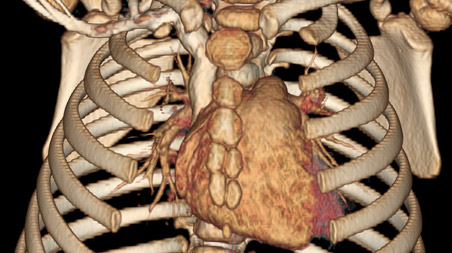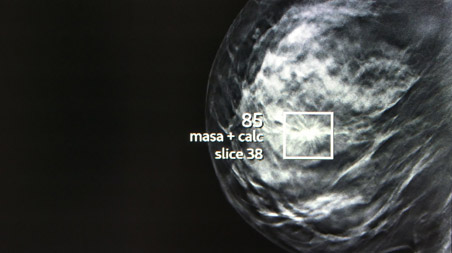
Diagnostic imaging
The Diagnostic Imaging Service at Olympia Centro Médico Pozuelo provides patients with the most advanced radiological testing, combined with a team of highly specialised radiologists.
Featured equipment
- Computerised Tomography (CT)

Computerised Tomography (CT)
Computerised tomography (CT) is an advanced diagnostic imaging technique that uses X-rays and computer technology to obtain detailed images of the inside of the body. This equipment allows organs, bones, blood vessels and tissues to be visualised with great precision. It is particularly useful for detecting internal injuries, tumours, infections or haemorrhages. The procedure is quick, non-invasive and provides key information for an accurate diagnosis. This state-of-the-art equipment allows studies to be performed with low doses of radiation. At our medical centre, CT is an essential tool for providing you with the highest quality and safest healthcare.
- Magnetic Resonance Imaging

Magnetic Resonance Imaging
Magnetic Resonance Imaging (MRI) is a medical imaging technique that uses magnetic fields and radio waves to obtain detailed images of the inside of the body without using radiation. It is particularly useful for studying the brain, spinal cord, joints and heart. It allows lesions, inflammation, tumours and other abnormalities to be detected with great precision. The procedure is safe, non-invasive and very effective for diagnosis. At our centre, MRI is key to offering you advanced and personalised medical care.
- Mammography

Mammography
Mammography is an imaging technique that uses low-dose X-rays to examine breast tissue. It is the most effective method for the early detection of breast cancer, even before symptoms appear. It allows microcalcifications, nodules and other abnormalities in the breasts to be identified. The procedure is quick, safe and can save lives thanks to early diagnosis. At our centre, we have state-of-the-art technology (tomosynthesis or 3D mammography) to offer you an accurate and comfortable mammogram.
- Ultrasound

Ultrasound
Ultrasound is a diagnostic imaging technique that uses high-frequency sound waves to visualise internal organs and structures in real time. It does not use radiation, so it is safe even during pregnancy. It is particularly useful for examining the abdomen, heart, muscles, joints and reproductive system. It can detect cysts, tumours, inflammation and other abnormalities. At our centre, ultrasound is an essential tool for making quick, accurate and risk-free diagnoses.
- Conventional radiology

Conventional radiology
Conventional radiology is an imaging technique that uses X-rays to obtain images of the inside of the body, especially bones, lungs and joints. It is quick, accessible and very useful for detecting fractures, infections, lung diseases and other abnormalities. The procedure is simple and takes only a few minutes. At our centre, we have modern equipment that guarantees high-quality images with the minimum dose of radiation. It is a basic but essential tool in everyday medical diagnosis.
- Densitometry

Densitometry
Bone densitometry is an imaging technique that measures bone mineral density, especially in areas such as the spine and hips. It is mainly used to diagnose osteoporosis and assess the risk of fractures. It is a quick, painless procedure with very low radiation exposure. This equipment allows for accurate calculation of body composition (percentage of muscle mass and fat). The results help to decide on preventive or therapeutic treatments. At our centre, densitometry is key to caring for bone health, especially in postmenopausal women and older people.
Areas of specialisation

Neuroradiology
Thanks to our next-generation MRI and computerised Tomography equipment, we are capable of responding to the increasingly demanding diagnostic requirements of neurologists and neurosurgeons with techniques including diffusion-perfusion, spectroscopy, functional magnetic resonance imaging and angiography.

Comprehensive diagnosis of breast pathology
We work with the most advanced Tomosynthesis and Digital Mammography technology, which produces less X-ray radiation and is more sensitive in the early detection of breast cancer. We participate in breast screening programmes.
We also carry out high-resolution studies in breast pathology, such as magnetic resonance imaging and biopsies. All without waiting times.

Cardiovascular diagnosis
Cardiovascular disease is the most common cause of death in Western societies. We have an ultra-low radiation multi-slice computed tomography scanner, a highly reliable diagnostic tool for studying coronary artery disease.

Oncological diagnosis
Technological advances facilitate the diagnosis and monitoring of cancerous processes through magnetic resonance imaging, computed tomography, mammography, and ultrasound. In addition, thanks to low-radiation equipment, we offer our patients a lung cancer screening programme.
We also carry out high-resolution studies in oncological pathology, using magnetic resonance imaging, computed tomography (CT) scans, biopsies, etc. All without waiting times.



